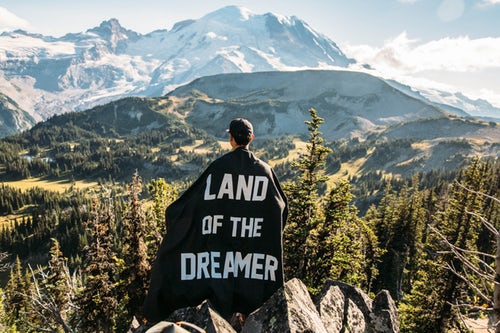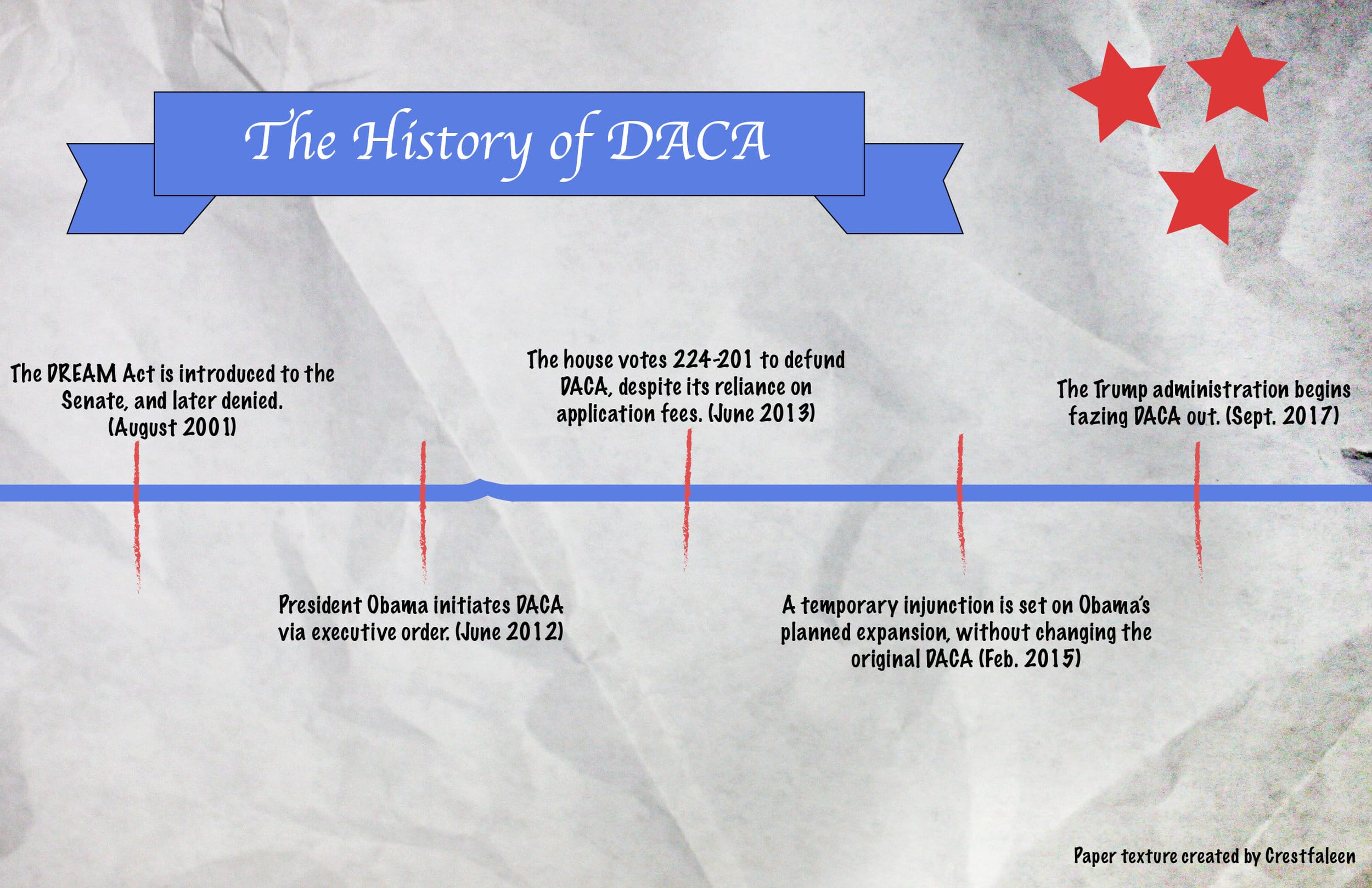
Dreamers in America
Abigail Welch, Staff Writer
Graphic courtesy of Caleb Arnold
In September of 2016, President Trump announced that he would let the “dreamers” program expire in March of this year unless Congress acted. Capitol Hill’s efforts to revive the Deferred Action for Childhood Arrivals program (DACA) as part of a broader deal on immigration policy have failed.
In August 2016, Candidate Trump introduced his 10-point immigration plan and said he would end DACA along with other programs directed at parents of U.S.-born children and lawful permanent residents. After Trump was elected, he seemed to soften his stance on DACA. He told Time magazine that he wanted to work out something for Dreamers that would make people “happy and proud.”
In his February 2017 press conference, Trump said DACA was “a very, very difficult subject” for him and that he wanted to “deal with DACA with heart.” After this conference, DACA was put on the back-burner in the media.
In September 2017, the Trump administration was rescinding the deferred-action program beginning in March 2018, potentially affecting 690,000 DACA beneficiaries.
Jump forward to the beginning of January 2018 where federal district judges in California and New York have issued nationwide injunctions against ending the program, siding with states and organizations challenging the administration’s rescission. The injunctions require the department to continue to accept renewal applications from those protected from deportation. The administration is not required to accept new applications.
On Jan. 16, 2018 the U.S. Justice Department said it would ask the U.S. Supreme Court to review the federal judge’s order that the administration resume accepting DACA renewal applications. The department also said it had appealed the case to the 9th U.S. Circuit Court of Appeals.
This past week, the Supreme Court declined to enter the national controversy over “dreamers,” turning down the Trump administration’s request to immediately review lower court decisions that keep in place the program that protects from deportation undocumented immigrants brought here as a child.
The litigation now will take its usual course, and the issue probably won’t return to the Supreme Court before the next term. In the meantime, the White House and Congress can continue to seek a political resolution.
Josue Gonzales, a student at North Greenville who is part of the Dreamers program, came to the United States at the age of 6 and has lived here ever since. He grew up in Berea where he lives with his mom, one brother and two sisters.
“Me and my sister are the first in our family to graduate high school, and I will be the first to graduate college with a bachelor’s in biology.” The biology program is what brought Gonzales to NGU.
Gonzales shared that his goal in life is to open a free medical clinic in underrepresented areas. He has volunteered at a free medical clinic for the past two years and he states that this experience has majorly influenced his goals.
“It does not matter what race you are, I truly believe that health care should be universal. There are many people that lack the medical care that they need because they cannot afford, thus I want to be that gateway,” said Gonzales.
After graduation, Gonzales is hoping to get into medical school to become a doctor. He wants to work in the United States and travel to Honduras to work there for a while. Afterwards, he will come back home with the experience and tools necessary to open his own medical clinic.
With such plans in mind, he ponders on the impact that the Dreamers program has made on his life. “Being a Dreamer has impacted my life tremendously. There is uncertainty as to what is going to happen in my future,” said Gonzales.
With being a Dreamer comes some set backs. “I am not able to apply to medical schools here in S.C., thus I have to apply to out of state schools, making the entrance to medical school much more difficult,” said Gonzales.
He went on to say that not only is it harder, but he has to apply to schools that are super difficult to get in. Being a Dreamer has made him who he is but it is also keeping him from accomplishing his hopes and dreams.
Gonzales is grateful for the program and feels that he would not have accomplished many of the things he has without it, although he does feel that it is keeping him from accomplishing his true potential.
When asked how he felt about the Supreme Court ruling, Gonzales said he felt good but that we are back where we started. There is much uncertainty yet no action has been taken.
“After completion of university, most Dreamers cannot practice their profession because of status. DACA is not the preferred status, but we could be in a situation that is worse. Most Dreamers that I know work really hard without knowing if their work is going to pay off.”
There is always uncertainty about the future for “Dreamers.” Those in the program don’t know if they’ll be in America for long, or if they will end up in a place they don’t really know just because they were born there.

